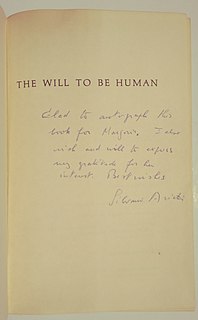A Quote by George Orwell
Creeds like pacifism or anarchism, which seem on the surface to imply a complete renunciation of power, rather encourage this habit of mind. For if you have embraced a creed which appears to be free from the ordinary dirtiness of politics ... the more you are in the right (and) everybody else should be bullied into thinking otherwise.
Related Quotes
Creativity is not simply originality and unlimited freedom. There is much more to it than that. Creativity also imposes restrictions. While it uses methods other than those of ordinary thinking, it must not be in disagreement with ordinary thinking-or rather, it must be something that, sooner or later, ordinary thinking will understand, accept, and appreciate. Otherwise the result would be bizarre, not creative.
The Church was resolved to have a New Testament, and as, after the lapse of more than three hundred years, no handwriting could be proved or disproved, the Church, which like former impostors had then gotten possession of the State, had everything its own way. It invented creeds, such as that called the Apostle's Creed, the Nicean Creed, the Athanasian Creed, and out of the loads of rubbish that were presented it voted four to be Gospels, and others to be Epistles, as we now find them arranged.
Every church pretends to have found the exact truth. This is the end of progress. Why pursue that which you have? Why investigate when you know? Every creed is a rock in running water: humanity sweeps by it. Every creed cries to the universe, "Halt!" A creed is the ignorant Past bullying the enlightened Present. The ignorant are not satisfied with what can be demonstrated. Science is too slow for them, and so they invent creeds. They demand completeness. A sublime segment, a grand fragment, are of no value to them. They demand the complete circle... the entire structure.
I'd have no rituals, but I'm a person of compulsive habit. That's just some awful residue of a ritual. And one of the reasons for that is my living this life, which is otherwise so free of obligations. It's not at all unusual for anybody who's independently employed to crave a way of living whereby they create the structures without which their lives would otherwise start slopping around all over the place.
You believe that reality is something objective, external, existing in its own right. You also believe that the nature of reality is self-evident. When you delude yourself into thinking that you see something, you assume that everyone else sees the same thing as you. But I tell you, Winston, that reality exists in the human mind, and nowhere else. Not in the individual mind, which can make mistakes, and in any case soon perishes: only in the mind of the Paty, which is collective and immortal.
Of course, in the reality of history, the Machiavellian view which glorifies the principle of violence has been able to dominate.Not the compromising conciliatory politics of humaneness, not the Erasmian, but rather the politics of vested power which firmly exploits every opportunity, politics in the sense of the "Principe," has determined the development of European history ever since.
I get some very fierce anonymous letters about the Athanasian Creed, which would amuse you, if they were not so sad as to what they imply on the part of the writers. The last tells me that I am a Pharisee, and should have helped to crucify our Lord. It is very odd that people should think, much more write, such things; but the passion of unbelief is a very serious thing while it lasts.
It can be helpful to remember that the enlightened mind and the ordinary mind are two sides of the same coin. The mind is like the sea, which can be rough on the surface, with mountainous waves stirred up by ferocious wind, but calm and peaceful at the bottom. Sometimes we can catch sight of this peaceful mind even in times of trouble. These glimpses of peace show us that we may have more inner resources to draw upon than we had realized. With skill and patience, we can learn how to be in touch with our peaceful selves.
My study of Gandhi convinced me that true pacifism is not nonresistance to evil, but nonviolent resistance to evil. Between the two positions, there is a world of difference. Gandhi resisted evil with as much vigor and power as the violent resister, but True pacifism is not unrealistic submission to evil power. It is rather a courageous confrontation of evil by the power of love. . . .
I should hate to be a regular girl with a sugar-plum voice. I should hate to have swan-like lashes, and a thick, sooty neck. I sound as though I’m joking, I know, but I should truly hate to be like Leanne, so charming and ordinary and stuffed with clichéd feelings. I’m glad I’m the ice maiden. Who wants to be crying over every stray dog? Not I. Scratch my surface and what do you see? More surface.





































